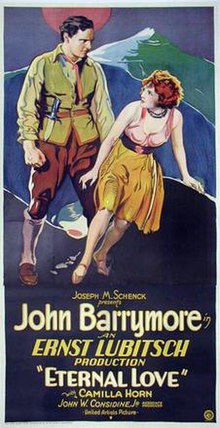
The Hollywood Revue of 1929, or simply The Hollywood Revue, is a 1929 American pre-Code musical comedy film released by Metro-Goldwyn-Mayer. It was the studio's second feature-length musical, and one of their earliest sound films. Produced by Harry Rapf and Irving Thalberg and directed by Charles Reisner, it features nearly all of MGM's stars in a two-hour revue that includes three segments in Technicolor. The masters of ceremonies are Conrad Nagel and Jack Benny.

The Smiling Lieutenant is a 1931 American pre-Code musical comedy film directed by Ernst Lubitsch, starring Maurice Chevalier, Claudette Colbert and Miriam Hopkins, and released by Paramount Pictures.

Lionel Barrymore was an American actor of stage, screen and radio as well as a film director. He won an Academy Award for Best Actor for his performance in A Free Soul (1931) and is known to modern audiences for the role of villainous Mr. Potter in Frank Capra's 1946 film It's a Wonderful Life.
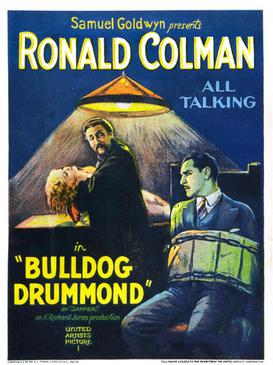
Bulldog Drummond is a 1929 American pre-Code crime film in which Hugh "Bulldog" Drummond helps a beautiful young woman in distress. The film stars Ronald Colman as the title character, Claud Allister, Lawrence Grant, Montagu Love, Wilson Benge, Joan Bennett, and Lilyan Tashman. Produced by Samuel Goldwyn and directed by F. Richard Jones, the movie was adapted by Sidney Howard from the play by H. C. McNeile.
This is an overview of 1929 in film, including significant events, a list of films released and notable births and deaths.

Victor Varconi was a Hungarian actor who initially found success in his native country, as well as in Germany and Austria, in silent films, before relocating to the United States, where he continued to appear in films throughout the sound era. He also appeared in British and Italian films.

Phyllis Maude Haver was an American actress of the silent film era.

Tempest is a 1928 American synchronized sound drama film directed by Sam Taylor. While the film has no audible dialog, it was released with a synchronized musical score with sound effects using both the sound-on-disc and sound-on-film process. V. I. Nemirovich-Dantchenko wrote the screenplay and William Cameron Menzies won an Academy Award for Best Art Direction for his work in the film in 1929, the first year of the awards ceremony. John Barrymore and Camilla Horn star in the film, with Louis Wolheim co-starring.

Mona Rico was a Mexico-born American actress. Her films include Eternal Love (1929), Shanghai Lady (1929), A Devil With Women (1930), and Zorro Rides Again (1937).
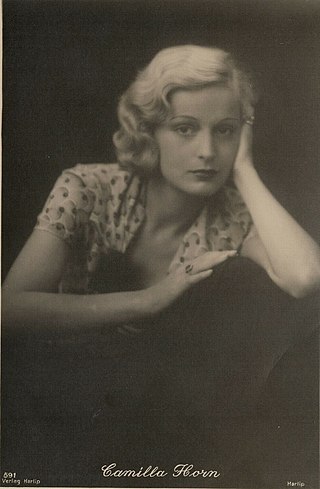
Camilla Martha Horn was a German dancer and a film star of the silent and sound era. She starred in several Hollywood films of the late 1920s and in a few British and Italian productions.

The Sea Beast is a 1926 American silent drama film directed by Millard Webb, starring John Barrymore, Dolores Costello and George O'Hara. The film was a major commercial success and one of the biggest pictures of 1926 becoming Warner Brothers' highest grossing film. The Sea Beast is the first adaptation of Herman Melville's 1851 novel Moby-Dick, a story about a monomaniacal hunt for a great white whale. However, the film alters the novel's plotline by establishing prequel and sequel elements that are not in the original story—such as the romancing of Esther and Ahab's safe return, respectively—and substitutes a happy ending for Melville's original tragic one. Some of the characters in the film do not appear in Melville's original novel. The film was so successful that in 1930 Warner Bros redid it in English and German, under the title Moby Dick, with Joan Bennett taking the role of Ahab's love because Dolores Costello was pregnant at the time.

The White Hell of Pitz Palu is a 1929 German silent mountain film co-directed by Arnold Fanck and G. W. Pabst and starring Leni Riefenstahl, Gustav Diessl, Ernst Petersen, and World War I pilot Ernst Udet. Written by Fanck and Ladislaus Vajda, the film is about a man who loses his wife in an avalanche while climbing the Piz Palü mountain, and spends the next few years searching the mountain alone for her body. Four years later he meets a young couple who agree to accompany him on his next climb. The White Hell of Pitz Palu was filmed on location in the Bernina Range in Graubünden, Switzerland.

Moby Dick is a 1930 American pre-Code film from Warner Bros., directed by Lloyd Bacon, and starring John Barrymore, Joan Bennett and Walter Lang. The film is a sound remake of the 1926 silent movie, The Sea Beast, which also starred Barrymore. It is the first film adaptation of Herman Melville's 1851 novel Moby Dick that includes a soundtrack.

His Glorious Night is a 1929 pre-Code American romance film directed by Lionel Barrymore and starring John Gilbert in his first released talkie. The film is based on the 1928 play Olympia by Ferenc Molnár.

Song of Love is a 1929 American pre-Code musical film directed by Erle C. Kenton and starring Belle Baker and Ralph Graves. It was released by Columbia Pictures on November 13, 1929. The film was the film debut of Belle Baker. The film contained songs but was also issued in a silent version. Actress Eve Arden made her film debut in the film, appearing under her real name, Eunice Quedens.
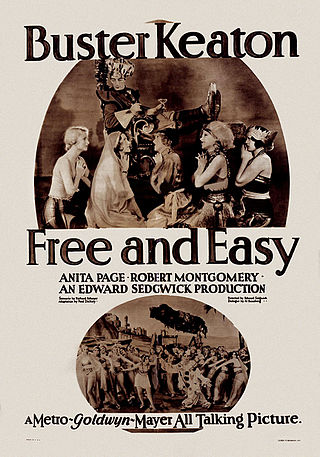
Free and Easy is a 1930 American pre-Code comedy film starring Buster Keaton. It was Keaton's first leading role in a talking motion picture.
Eternal Love may refer to:

Marianne is a 1929 pre-Code romantic-musical film set at the end of World War I. Marianne is French farm girl who, although her French fiancé is away, fighting, falls in love with an American soldier. It is a remake of a silent film that was released earlier in 1929. Although the films feature mostly different casts, Marion Davies starred in both versions. This was Davies' first released talking movie. The pictures were released less than eleven years after the Armistice, and the title would have had a profound meaning for European audiences. “Marianne” has been a beloved personification of France and the battle for democracy—and the courage of French women in particular—since the Revolution. She was a key figure in French propaganda, and American men who served in Europe in 1917-1918 would have seen representations of her all around them, in public buildings, on posters and in newspapers, on coins and postage stamps.
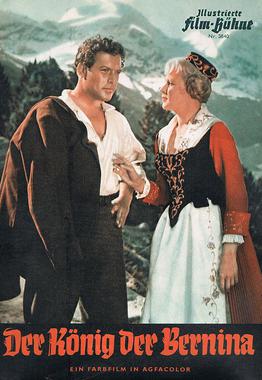
The King of Bernina is a 1957 Austrian-Swiss historical drama film directed by Alfred Lehner and starring Helmuth Schneider, Waltraut Haas and Walter Janssen.

Jakob Christoph Heer was a Swiss novelist and travel writer.
